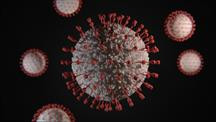The recent emergence of two COVID-19 variants, collectively referred to as FLiRT, has taken center stage in the U.S., accounting for a significant portion of new cases and introducing fresh challenges for public health officials and the community. The Centers for Disease Control and Prevention (CDC) has identified these variants, KP.2 and KP1.1, as the dominant strains, overtaking the previously predominant JN.1 variant.
KP.2 alone is now responsible for 25% of all COVID-19 cases in the country, while KP1.1 accounts for about 7.5%. These variants have been highlighted for their increased transmissibility and the partial resistance they exhibit against current vaccines and previous infection-induced immunity.
Despite the shift in dominant variants, the symptoms reported remain consistent with those triggered by earlier strains, including sore throat, cough, fatigue, and fever, among others. The persistence of these symptoms underscores the virus's ongoing impact on individuals, despite a lower rate of hospitalizations compared to earlier stages of the pandemic.
Public health experts, including Megan L. Ranney, dean of the Yale School of Public Health, have voiced concerns over the FLiRT variants' capabilities, particularly their mutations in the spike protein which enhance the virus's ability to infect host cells and cause illness. This mutation trend continues to complicate the global effort to control COVID-19 transmission and infection rates.
The situation is further exacerbated by a significant drop in vaccination rates. According to the CDC, only 22.6% of adults in the U.S. have received an updated vaccine since their release in September 2023, with the highest uptake among older adults aged 75 and over. This decrease in vaccination coverage raises the likelihood of a resurgence in cases, especially with less than a quarter of the adult population protected against these newer strains.
Amid these developments, the FDA has delayed a meeting originally scheduled to decide on the formulation of this fall's updated COVID vaccines. The delay, intended to allow more time for data collection on circulating variants, reflects the ongoing uncertainty surrounding the virus's evolution and the effectiveness of existing vaccines against emergent strains.
While hospitalizations remain at their lowest since the pandemic began, with only 5,098 cases reported in the most recent data, there remains a cautious outlook on the potential for an increase in cases. This concern is driven by the combination of waning immunity, the emergence of new variants, and a public that may be less engaged with pandemic precautions than in the past.
Experts continue to advocate for vaccination as a critical tool in combating severe illness, despite the mutations. Early data from this year's vaccines showed a 50% reduction in the risk of illness, emphasizing the continued benefit of receiving the shots.





